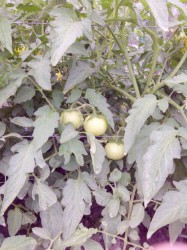Two local companies operating in tandem out of modest premises in Waterloo Street have set themselves the twin tasks of significantly broadening the variety of fruits and vegetables cultivated locally and expanding markets in the Caribbean and further afield.
Oumdeo Ramdeo, an accountant by profession is a major investor in the companies, Agroin and Pascargo. Ramdeo and Alvin Parag, a University of Guyana-trained agricultural scientist, are the men behind the project which they say can cater to a broader range of local tastes in fruits and vegetables while significantly increasing the earning capacity of local farmers by maximizing exports.

The project is banking its success on a package of enhanced approaches to farming and marketing which includes the importation and distribution of high-quality seeds, enhanced crop care through the application of treatments manufactured by a world-renowned company and the use of its own cargo service, Pascargo, to reduce shipping costs. The end of 2014 has been targeted as the time frame for the commencement of exports to the rest of the region.
Importantly, Ramdeo and Parag are seeking to work with the local farming community to replace a number of vegetables currently imported into Guyana with local varieties. The pair have discerned that travel and migration have created demand for vegetables like broccoli and cauliflower and are seeking to ensure that locally grown varieties appear on the market stands. Additionally, they are seeking to add to the varieties of tomato, lettuce and cabbage consumed locally.
The significance of the project reposes in the fact that it seeks to keep Guyana at the centre of a regional food security drive, which, from all indications, is making only halting progress in much of the rest of the region. As the regional food import bill grows several Caricom countries appear to be paying no more than lip service to food security. Without saying so directly, Ramdeo and Parag believe that the timing of their own project is significant.
Currently in its fourth month of operation Agroin seeks to provide local farmers with high-quality seed stock and the attendant technical expertise in the cultivation process. Additionally, according to Ramdeo, the company is prepared to further support the farmers by assisting in the securing of loans from the local commercial banking sector. The objective is the creation of a clutch of efficient satellite farms that will re-sell their produce to Agroin.

The local company serves as a distributor of food crop seeds for Agronova, a company widely regarded as one of the world’s leading suppliers of high quality seeds. Among the seeds being distributed for local distribution are calaloo, boulanger, thyme, sweet corn, cabbage, sweet peppers and ochro.
Ramdeo says the project was in the making for two years and it seeks to provide optional approaches to farming in Guyana to take account of the growing regional and global demand for food and the economic opportunities that have become available to Guyana.
Much of the preparatory effort has gone into seed selection. Specially adapted for farming in the tropics the seeds are tested in Africa and at field stations in Miami and France and marketed in the United States and the Caribbean. Those imported into Guyana are secured from the field stations in Miami and are distributed through local nurseries across the country, chiefly, the AK Plant Shop at Zeeburg on the West Coast Demerara. Several farmers across the country have secured samples of the seeds.
Parag, who has overall technical responsibility for the execution of the project says that working through nurseries across the country has enabled the creation of a network of farmer clients. Parag says that Agroin is also working directly with farmers at Hope Estate, Mahaica, Berbice, Parika and in villages along the Essequibo Coast.
Allied to the project designed to maximize farm production is an initiative that seeks to ensure high-quality agricultural yield. Agroin’s seed distribution programme is attended by the parallel distribution of plant nutrients including fertilizer and insecticides manufactured by Syngenta, the world leader in the field.
While farm produce cultivated from the seeds provided by Agroin can already be bought on the local market, Parag says that the project remains in its trial phase. Once that phase is over and the evaluation is completed the company will then begin to work with farmers on the commercial production of crops. Seeds and plant care material will become available through agricultural supplies’ outlets across the country.

Parag explains that Syngenta’s plant care and nourishment regime focuses on crop-specific treatments as against the common general purpose treatments available on the market. Bora, for example, has its own particular chemical treatments as do calaloo and cucumbers.
Ramdeo is upbeat about the potential for growth in the relationship between Syngenta and the local agricultural sector. The company, he says, recognises Guyana as a frontier agricultural territory in the Caribbean and is keen to serve the farming community here.
Ramdeo concedes that part of Agroin’s challenge has to do with persuading farmers to buy into what the company is offering. He says that there has already been evidence of skepticism among some farmers who are committed to their tried and proven methods. He believes, however, that the sustained efforts of Agroin to market its methods coupled with the outcomes of the initiative will eventually win more farmers over. The company, meanwhile, has recruited technicians who conduct farm visits across the country.
Anticipating as it does that the outcome of the project will realise an abundance of healthy fruit and vegetables, Agroin has already been looking to the region as its first port of call for external markets. Parag says market possibilities are already being explored in Trinidad and Tobago and Curacao and that the company intends to broaden its efforts. More markets, he says, will mean increased earnings for satellite farmers across the country who embrace the project. The company is currently in discussion with the local company Bounty Farms with a view to securing tips on working with satellite farmers.
Agroin’s plan includes the creation of a model farm that will serve the dual purpose of a demonstration station as well as a model with which to market the success of the project.
Ramdeo says the project is securing a measure of official support in the form of access to government’s storage bond at Parika. Additionally, refrigerated trucks which are part of the bond’s inventory will be used to transport farm produce to market.




